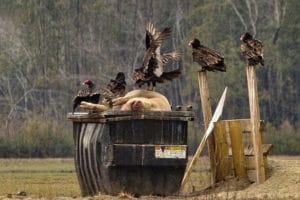Cornucopia’s Take: North Carolina’s legislature has put its weight behind industrial hog farming, limiting the amount of money people can collect in lawsuits against hog farms over quality-of-life issues caused by pollution from their operations. North Carolina Governor Roy Cooper vetoed the law that provided protections to the offending polluters, but his veto was overridden by the North Carolina House and Senate along party lines.
NC hog farms win legal protections; Senate overrides Cooper’s veto
The News & Observer
by John Murawski
 |
North Carolina’s hog farms won an extra measure of protection from lawsuits Thursday, after the state Senate overrode a veto by Gov. Roy Cooper, who had sought to preserve the right of property owners to sue farmers over quality-of-life issues.
The state Senate narrowly defeated Cooper’s veto, a day after the House took the same step. The Senate vote was 30 to 18, mostly along party lines, in a procedure that requires support from three-fifths of lawmakers present. The vote was similar Wednesday in the House, with 74 voting to override the governor’s veto, and 40 voting to support the governor.
The new law limits the amount of money people can collect in lawsuits against hog farms for odors, headaches, flies and other aggravations. Critics have said the law limits financial recovery to the point that such lawsuits are not likely to be filed in the future.
“It is extremely disappointing the legislature has acted to overturn the veto in order to provide special treatment to a powerful industry,” said Molly Diggins, North Carolina director of the Sierra Club, in a statement. “We hope the override vote isn’t a slippery slope that will lead to special treatment for other favored industries at the expense of regular North Carolinians and a clean environment.”
Supporters of the legislation said it protects a vital state industry from predatory lawyers and financial uncertainty.
“The votes this week in the House and Senate, by members of both political parties, sent a clear message that lawmakers support agriculture and its unique role in providing food to families,” said Andy Curliss, CEO of the N.C. Pork Council, in a statement.
The measure, which protects all agricultural and forestry operations, was prompted by 26 federal lawsuits filed against the state’s largest pork producer, Murphy-Brown, a subsidiary of Smithfield Foods. In other states, such lawsuits have resulted in jury awards of hundreds of thousands of dollars to local residents. North Carolina’s law will limit financial recovery to several thousand dollars, according to some estimates.
An early version of the law, House Bill 467, would have applied retroactively to the Murphy-Brown cases, but lawmakers stripped out that provision amid objections from Democrats and Republicans alike that it would be inappropriate for the legislature to intervene in a pending legal dispute.
On Thursday, all 15 Democrats in the Senate supported Cooper, and were joined by three Republicans who had previouly voted against the legislation, including Tamara Barringer of Wake County. Two Republicans were absent who had previously voted for the bill when it passed the Senate last month.
In the House vote to override Cooper’s veto, seven Democrats voted against the Democratic governor, and three Republicans voted with him.
North Carolina has about 9 million hogs on nearly 2,300 hog farm operations, many of them concentrated in the eastern part of the state. The large farms, which can contain thousands of hogs, treat the hog feces and urine in open-air lagoons, from which water is pumped onto crops as a nutrient-rich fertilizer.
Nearly 500 residents living near those farms allege in the lawsuits that they are subjected to revolting odors as well as swarms of flies and buzzards attracted to outdoor bins where pig carcasses are dumped for pickup by haulers. The lawsuits include allegations that the spraying from the lagoons disperses fecal bacteria that wafts across property lines and settles on cars, homes and lawns.
North Carolina’s hog farming practices have been under scrutiny for decades. Amid rising public health concerns, the state banned the construction of new hog farms in 1997 that treat hog waste in open-air lagoons. More than 30 scientific studies have documented public health and environmental problems arising from industrial hog farming here.

